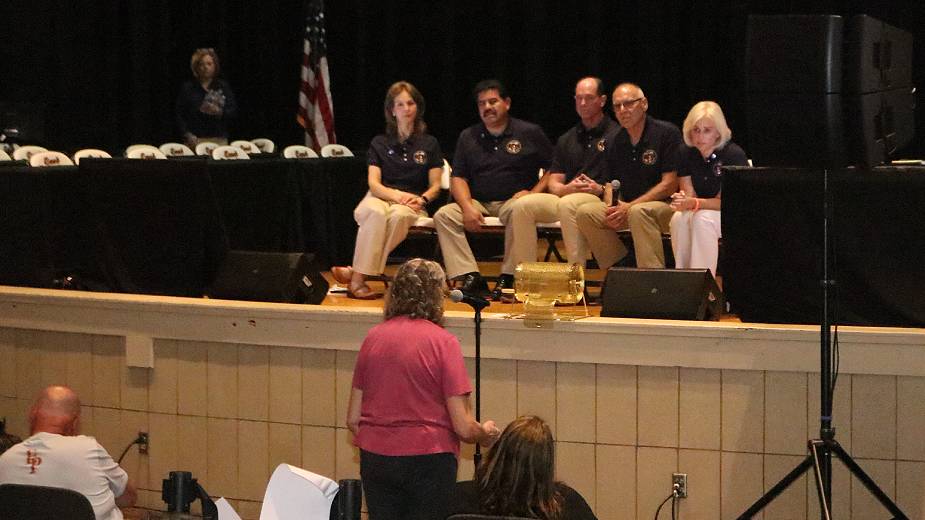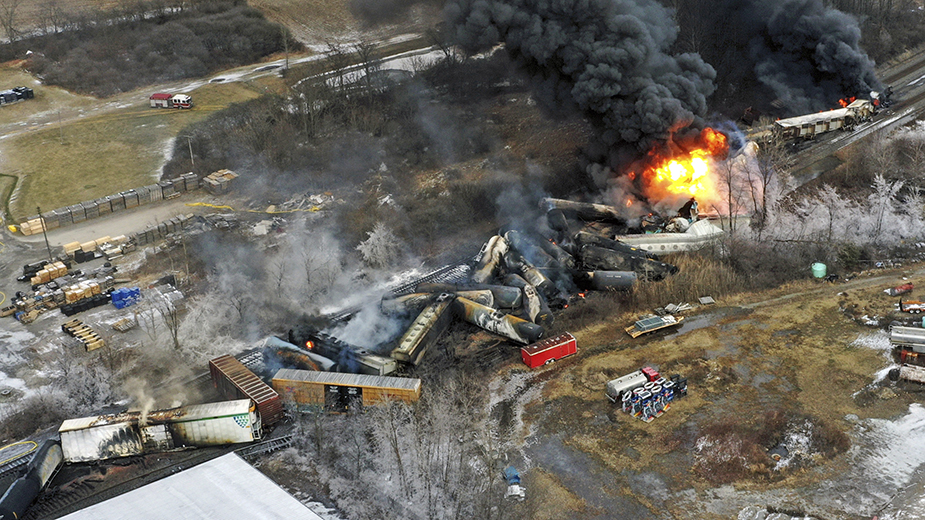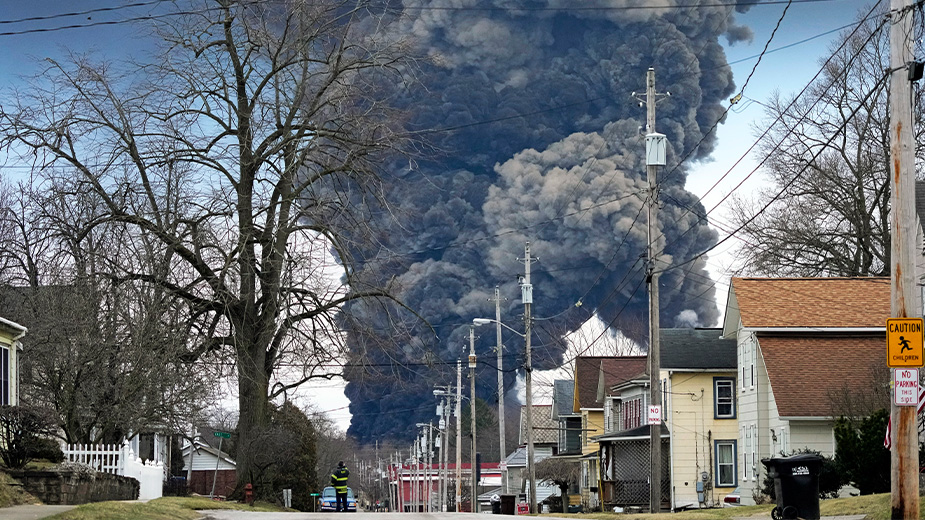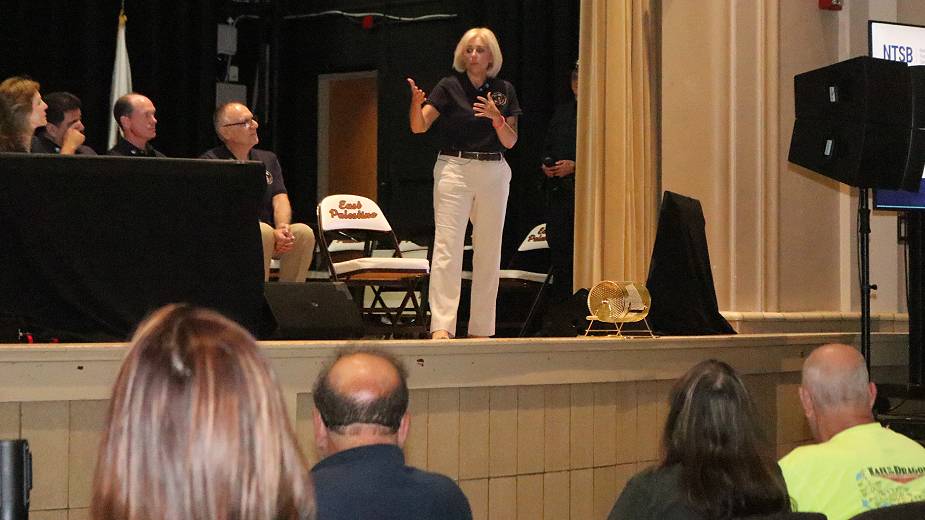NTSB Hears Questions and Concerns from East Palestine Residents
EAST PALESTINE, Ohio – Residents took to the microphone at a community meeting held by the National Transportation Safety Board, asking questions about the investigation of the Feb. 3, 2023, train derailment in the village and expressing their continuing concerns for their health and safety.
Statements during Tuesday’s meeting at East Palestine High School came from those who said they have not felt safe returning home, those who said they have struggled to get answers or felt not believed by medical professionals – and those who say their concerns remain unaddressed despite what they know they heard, smelled and saw after the Norfolk Southern freight train derailed.
Their chance to speak came after a nearly seven-hour NTSB meeting, in which the agency announced a long list of recommendations to Norfolk Southern, the Federal Railway Administration, those overseeing chlorine-related chemicals, the county Emergency Management Agency and others in the rail industry.
NTSB Chairwoman Jennifer Homendy told the crowd that the 31 new recommendations and four reiterated ones passed by the board Tuesday would stop the next East Palestine disaster from happening, but only if they are adopted.
Earlier in the day, NTSB investigators blamed the derailment on an overheated wheel bearing on a hopper car and the inability of detectors in Sebring and Salem to alert the crew of the impending failure of the bearing. Investigators said the breach of three DOT111 tankers, including one carrying butyl acrylate, created a long line of fire as it spilled flammable contents along the tracks.
Then the NTSB turned its attention to Norfolk Southern’s response following the derailment, including the failure to supply the incident commander with the information that a vinyl chloride tank car that had shown signs of getting hotter was actually cooling before a vent and burn was conducted.

Investigators said despite Oxy Vinyls, the chemical company responsible for the vinyl chloride contained in five of the cars, being on-site and providing information to the contrary of a polymerization threat of explosion, Norfolk Southern and its contractors were already planning for the vent and burn.
That planning began well before the decision was officially made, and press releases initiating the evacuation of residents due to the potential of a catastrophic explosion were based on faulty information, according to the NTSB investigation.
Homendy said the scene was chaotic and hampered by a lack of compatible communication systems between the 48 responding firefighters and volunteer firefighters who had only 36 hours of training, and no hazmat training. But she was careful not to blame the local East Palestine fire chief and deputy chief for their actions. She pointed to Norfolk Southern for failing to provide them with the information they needed to make the best decisions during their efforts to battle the initial fire.
After the hearing, Homendy took her criticism of Norfolk Southern a step farther, criticizing the railroad for its actions during the investigation, including failing to supply requested video and audio to the NTSB until after five requests – and then supplying only 20 minutes of it. Additionally, Homendy alleged that a Norfolk Southern representative made threats and tried to improperly influence the investigation by creating their own tests on vinyl chloride long after the derailment.
She said the Norfolk representative suggested that “this was an opportunity to close a chapter and allow the community … and the railroad to move on,” and then insisted that the NTSB defend the railroad going forward.
“It is not our role to defend Norfolk Southern,” Homendy said. “We’re here to protect the American people and the traveling public. Our entire mission centers around learning from the past and building a better, safer future for all.”
Homendy said Norfolk Southern attempted to go around investigators by going straight to board members and invited them to view the site and a new digital scanning device in Leetonia before the hearing. She had concerns that such site visits create an appearance of impropriety, and she said she struggled with whether to release this information.
“But Norfolk’s actions were unconscionable, and I want everyone who works with the NTSB on current or future investigations to understand this – we are impervious to anything but the truth,” Homendy said. “We are the gold standard when it comes to accident investigation around the world. I will not allow … any entity to impune that reputation or malign the reputation of our investigative staff, our top-notch investigation staff.”
In addition to an ongoing investigationinto the safety culture at Norfolk Southern, Homendy called for an evaluation of NTSB policy, procedures and recommendations to make sure nothing was unduly influenced.

Despite the long day, as East Palestine residents approached the stage to talk about post-traumatic stress disorder, ongoing health concerns and the feeling that the railroad, Environmental Protection Agency and others are not looking out for their best interests, Homendy let them vent for more than two hours. Some thanked her and the NTSB staff for being thorough and bringing the hearings to East Palestine.
When asked what they could do to help the NTSB get its recommendations taken seriously by railroads and oversight agencies, Homendy suggested they call the agencies and lawmakers themselves.
Although the Railway Safety Act was quickly proposed by legislators soon after the derailment, it has stalled. Even as the NTSB continued to meet Tuesday, Sens. Bob Casey, D-Pa., Sherrod Brown, D-Ohio, and J.D. Vance, R-Ohio, all sent out press releases again calling for the passage of the bipartisan legislation.
“Norfolk Southern’s information-sharing failure placed Pennsylvania first responders in needless, irresponsible danger. This final rule is an important step to protect our first responders, but we need to pass legislation that protects our communities from train derailments,” Casey said. “I will keep fighting for the Railway Safety Act for as long as it takes so we can ensure that no community suffers through the devastation Darlington experienced.”
Vance suggested the Railway Safety Act would go a long way to improve rail safety standards and prevent future disasters.
“I won’t stop fighting for those residents until they get the accountability they deserve,” Vance said.
“Today, the NTSB made crystal clear what we have been saying for over a year – stronger rail safety regulations are needed immediately,” Brown said. “Congress needs to pass the Railway Safety Act to enact stronger safety rules and hold the big railroad companies accountable. This report shows that Norfolk Southern’s greed and neglect for public safety is the reason this derailment happened, and the people of East Palestine have suffered the consequences.”

The lawmakers were not the only ones promising to be in the battle for the long haul. Homendy told the crowd she will be meeting Wednesday and throughout the week with government officials, including Pete Buttigieg, U.S. secretary of Transportation, about NTSB’s findings. She also agreed to pass along the concerns she had heard from residents.
Homendy vowed several times that the NTSB will continue to work with residents seeking additional rail safety and dealing with the knowledge that hazardous chemicals continue to travel through small towns like East Palestine daily.
The NTSB on Tuesday released a 13-page executive summary of its report. The full 300-page report is expected to be released in the next few weeks.
Pictured at top: NTSB Chairwoman Jennifer Homendy speaks before the community meeting in East Palestine on Tuesday night.
Copyright 2024 The Business Journal, Youngstown, Ohio.



